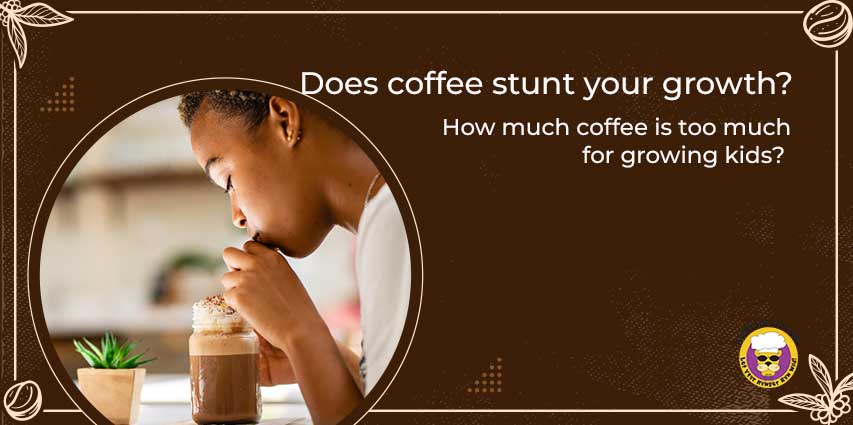“Does coffee stunt your growth?” That’s what my mother said when my child wanted to drink coffee as a kid. As a parent, ensuring your child is growing at a healthy rate and hitting their milestones is of utmost importance.
While giving your child well-balanced meals and plenty of physical activity are fundamental components to promoting healthy growth, many parents also worry about the potential adverse effects that drinking caffeinated beverages could have on their kids’ development.
Though there has been much debate about this issue for quite some time now, in this post we will explore the latest research to help provide you with a better understanding on if caffeine can actually stunt your children’s growth.

How much coffee is too much for growing kids?
The American Academy of Pediatrics (AAP) recommends limiting caffeine to no more than 100 mg per day for children aged 4–6 years, no more than 85 mg per day for children aged 7–9 years, and no more than 2.5 mg/kg body weight per day for those aged 10 and older.
It is also important to note that caffeine can be found in many other forms of food and beverages besides coffee, including energy drinks, tea, soda, chocolate and some snack foods. Therefore, it is important to read labels closely when it comes to determining your child’s daily caffeine intake.
Related article:
Can You Make Espresso In A Keurig? (Easy Steps)
Does coffee stunt your growth?
The short answer to this question is that, at the moment, there is not enough evidence to support the claim that caffeine will stunt your child’s growth. Though research has suggested some potential negative effects of consuming too much caffeine – such as supressing appetite and promoting dehydration – it’s important to note that these studies have been conducted on adults and not on children.
However, while there is no evidence to suggest that consuming caffeine can directly stunt your child’s growth, it’s important to be mindful of the amount of caffeine that your child consumes. This is especially true for younger children whose bodies are still developing and may be more sensitive to the effects of caffeine.
According to the American Academy of Pediatrics, it is not recommended for children under 12 years old to consume more than 85 mg of caffeine a day, while adolescents between the ages of 12 and 18 should not exceed 100 mg per day.
What is a reasonable intake of caffeine?
As with anything, moderacy is key. According to the American Academy of Pediatrics (AAP), children aged 4-6 should not exceed a daily caffeine intake of 45 milligrams (mg). For children between 7 and 9 years old, the maximum limit is set at 62 mg per day. As for those aged 10 and older, an intake of up to 85 mg per day is recommended.
What is the connection between caffeine and growth?
While there have been some studies that suggest a link between caffeine intake and stunted growth, most researchers seem to agree that moderate consumption of caffeinated beverages does not have an effect on height or weight gain in children.
A study conducted in the Netherlands found that boys who consumed at least one glass of cola a day were not any shorter than those who did not. Additionally, the study also concluded that coffee did not have an effect on height either.
So, can caffeine stunt my child’s growth?
Based on current research, moderate caffeine intake does not seem to have a negative impact on growth in children. However, it is important to remember that caffeine is a stimulant and can still cause restlessness, difficulty sleeping and other side effects depending on the individual.
Therefore, if you are concerned about your child’s development or think they may be drinking too much caffeine, speak to your healthcare provider to get personalized advice. Ultimately, using common sense and the recommended guidelines set out by the AAP should help keep your child on a healthy growth path.
Effects of caffeine on children and teenagers
Caffeine consumption should be limited for children and teenagers. Too much caffeine can cause restlessness, irritability, difficulty concentrating, headaches, increased heart rate, dehydration and more. In adolescents, it may also lead to problems with sleep and a lack of energy during the day.
Caffeine can also interact with other medications they are taking or increase the risk of addiction in those who are prone to developing substance abuse disorders. Additionally, excessive caffeine intake can cause an irregular heart rate and increase blood pressure, which can result in long-term health problems. For these reasons, it is important to monitor your child’s caffeine consumption and keep it within safe limits.

What to do if you’re worried about how coffee is affecting your health
If you are concerned about how coffee is affecting your child’s health, speak to your healthcare provider for advice. Your doctor can provide a personalized plan that takes into account their individual needs and lifestyle. Additionally, it may be helpful to talk to your child about caffeine consumption and the potential risks associated with it. This will help them make more informed decisions about their diet and ensure they stay healthy.
Does coffee, or caffeine, stunt growth?
Overall, research suggests that caffeine does not have an effect on height or weight gain in children. However, it is important to remember that caffeine is still a stimulant and can cause side effects depending on the individual.
Therefore, if you are concerned about your child’s growth or think they may be drinking too much caffeine, speak to your healthcare provider to get personalized advice. Ultimately, using common sense and the recommended guidelines set out by the American Academy of Pediatrics (AAP) should help keep your child on a healthy growth path.
FAQs
Q: Can caffeine stunt my child’s growth?
A: Based on current research, moderate caffeine intake does not seem to have a negative impact on growth in children. However, it is important to remember that caffeine is a stimulant and can still cause restlessness, difficulty sleeping and other side effects depending on the individual. Therefore, if you are concerned about your child’s development or think they may be drinking too much caffeine, speak to your healthcare provider to get personalized advice.
Q: What is a safe amount of caffeine for children?
A: The American Academy of Pediatrics (AAP) recommends limiting caffeine intake for children to no more than 85 mg per day. This is equivalent to one 8-ounce cup of coffee, two cans of soda or four cups of tea. Additionally, it is important to remember that some energy drinks and other caffeinated beverages contain higher amounts of caffeine, so be sure to read labels carefully. If you are still concerned about your child’s caffeine intake, speak to your healthcare provider for personalized advice.
Conclusion
While the jury is still out on how much caffeine is too much for growing kids, it’s generally agreed that moderate amounts are fine. If you’re concerned about your child’s caffeine intake, talk to their pediatrician. They can help you decide if your child is getting too much and offer guidance on cutting back. Have you had a conversation with your child about their caffeine consumption? What tips do you have for other parents?
I’m Kara Chavez, and I love coffee. I like to create some of the best coffees around – espressos, lattes, macchiatos – you name it. I strive for perfection in my coffee-making skills, and I take great pride in providing a delicious cup of joe to my customers.
I’ve been working in the coffee industry for years now, and I know everything there is to know about making a perfect cup of coffee. My passion for coffee shines through in every cup that I make, and I hope that you’ll stop by soon so that I can share my love of coffee with you!


Explore the captivating world of coffee and indulge in its rich aroma, flavors, and traditions. Discover the perfect brewing methods, diverse coffee varieties, health benefits, and mouthwatering recipes. Whether you’re a coffee enthusiast or a casual drinker, dive into the delightful journey that coffee has to offer.